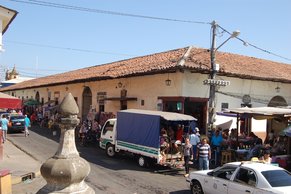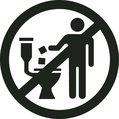
Because we arrived in León, Nicaragua, late last night we were tired so his presence did not register immediately when we left our BnB with glazed eyes. We came to spend three months here to avoid the cold Canadian winter… to experience life in a third world country, the second poorest in the western hemisphere after Haiti…to leave our comfort zone, test ourselves in a foreign land. This was not our first visit to Nicaragua so we knew all about her warm and hospitable people.
In the morning, following a hard travel day and a restless sleep, we had just stepped from our accommodation onto the uneven, narrow sidewalk, turning to our right. Out of thin air, he appeared on my left. A boy about 8 with large brown eyes. He said nothing. But he raised his hand, waving fingers frantically in his mouth. I stopped. Stared. Then he vanished.
Trying to forget his haunting look, I continued on with our plan. Our first task in this culturally-rich university city was to find a permanent address. We hoped to rent a casa near centro where we could walk to the cathedrals, parks, mercados and places frequented by locals. Of course, being North American, we wanted internet, a fully equipped kitchen, a clean, modern bathroom and any other amenities to make our life comfortable.
While we looked, though, I kept thinking, but what about that little boy? Where does he live?
As we searched, using BnB guest/host contacts, walking around looking for signs to rent (se alquilar), frequenting tourist bureaus, visiting real estate offices, scouring the internet, we began to lose hope. Small casas we saw were too far away or else bare, dirty and dark shanties, begging for TLC, not in great neighbourhoods.

Lest I paint too romantic a picture, please be aware of the opposites. We cannot flush tissue down toilets in this city: Please do not put any paper in the toilet to avoid plumbing problems. Used tissues must be deposited in the garbage bin located beside the toilet. Although León is relatively clean, watch you don’t break a leg on the many sidewalk potholes and chunks of broken pavement. Pockets of poverty---a weary elderly shoeshine man with bent back hoisting his trade tools across the central square; an old, barefoot woman peddling postcards; a younger one, tired already, extending her hand---exist alongside scores of university students sitting on the cathedral’s base scanning their cell phones.
As we retrace the steps to our BnB, I spy a long, lean, and gaunt older gentleman dressed in black, trailing closely behind us. His hair is sparse and grey. His bearing is regal. We enter Paz de Luna; he automatically follows. Startled, I turn to investigate before we disappear to our room. I see him approach the desk, motioning in his mouth with waving fingers. This time I signal to the staff, we will pay for his food. She smiles, nods, shows him to a table.
The frail stranger, sitting with back straight, is staring out the window at the clear, cloudless day, waiting patiently for food. He does not see us.
That’s when I recall the painted message on the wall of a local café, Pan y Paz (Bread and Peace)… the world would be a better place if everyone had bread and peace everyday.
Which reminds me again of the street boy with the brown eyes. I saw him for only a second but he will haunt me for a lifetime.
 RSS Feed
RSS Feed